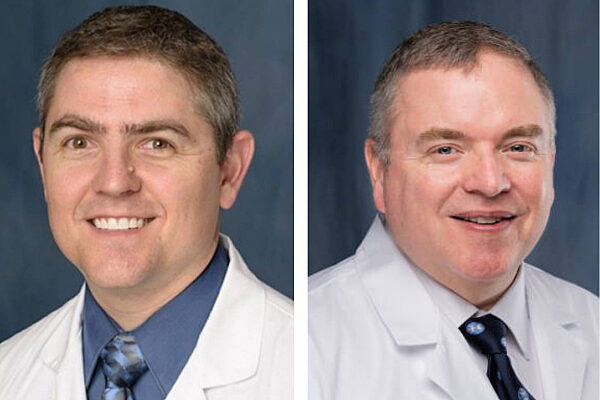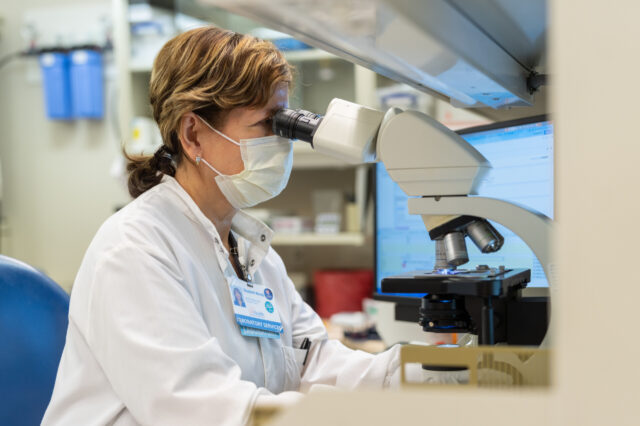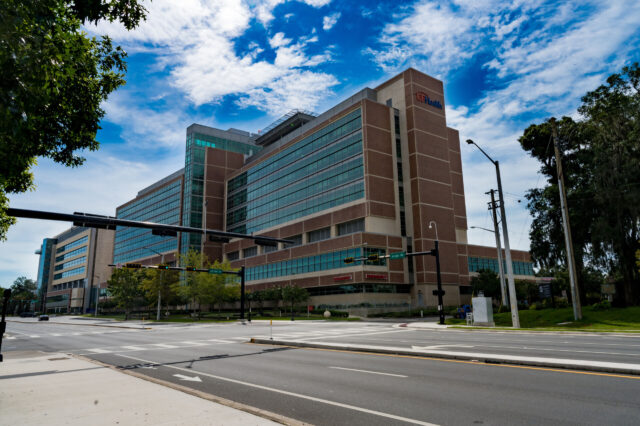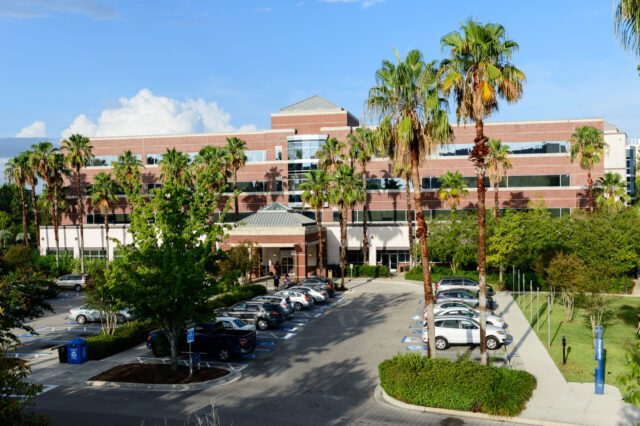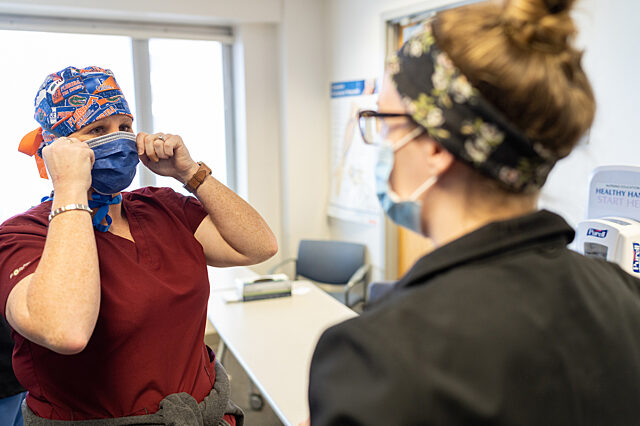UF Health’s team of expert hematologists is committed to providing top-notch care to patients with blood-related disorders. We specialize in the diagnosis, treatment and management of a wide range of blood disorders, including anemia, hemophilia, leukemia, lymphoma and thrombocytopenia, among others.
At UF Health, we offer a comprehensive approach to care that considers not just your medical needs, but also your emotional and psychological well-being. Our team of compassionate professionals is here to provide you with the support and guidance you need every step of the way.
Our state-of-the-art facilities feature the latest technologies and equipment, allowing us to provide the most advanced treatments and therapies available, including CAR T-cell therapy. Our team of hematologists is highly skilled and experienced, and we use a collaborative approach to care, working closely with other medical specialists to provide the most effective and personalized treatment for each patient.
Whether you need a simple blood test, a complex bone marrow transplant or ongoing care and management of your blood disorder, UF Health is here for you. We are dedicated to improving the lives of our patients and their families, and we strive to make your experience with us as comfortable and stress-free as possible.
If you or a loved one is dealing with a blood-related disorder, contact us today to schedule an appointment with one of our expert hematologists. We look forward to helping you achieve the best possible outcomes and regain your quality of life.
Hematology at a glance
Hematology is a subspecialty of medicine concerned with the study of blood, the blood-forming organs, and blood diseases. Hematology includes the study of etiology, diagnosis, treatment, prognosis and prevention of blood diseases.
Hematology combines the disciplines of biology, physiology, internal medicine, pathology, clinical laboratory work and pediatrics. Hematologists also very frequently do further study in oncology — the medical treatment of cancer.
Physicians who specialize in hematology are called hematologists. Hematologists typically care and treat of patients with hematological diseases, and sometimes work in a hematology laboratory viewing blood films and bone marrow slides, interpreting hematological test results.
The field of hematology encompasses a wide range of topics, including the study of blood cells, their functions and abnormalities that can occur in their production, function or structure. Hematology also covers the study of blood clotting and the treatment of blood-related disorders.
In addition, hematology can involve the study of blood transfusion and blood banking, which involves collecting, testing and storing blood and blood products for use in transfusions and medical treatments.
The field of hematology has made significant advances in recent years, with the development of new treatments and therapies for blood-related disorders. Hematologists work closely with other medical specialists, such as oncologists, to provide comprehensive care for patients with blood-related diseases.
Frequently asked questions
What cancers are detected by blood tests?
While blood tests can be useful for detecting certain cancer-related changes in the body, they are not typically used as the primary method for cancer diagnosis. Instead, they are often used as a tool to help confirm a suspected cancer diagnosis, monitor the progression of cancer, or check for cancer recurrence after treatment.
That being said, there are some specific types of cancer that may be detected or monitored through blood tests. Here are a few examples:
Prostate cancer: A prostate-specific antigen (PSA) blood test may be used to screen for prostate cancer or monitor its progression.
Breast cancer: Some breast cancers produce elevated levels of certain proteins that can be detected through blood tests, such as CA 15-3 and CA 27-29.
Ovarian cancer: The CA 125 blood test may be used to monitor ovarian cancer, but it is not typically used as a screening test.
Colorectal cancer: The carcinoembryonic antigen (CEA) blood test may be used to monitor colorectal cancer, but it is not typically used as a screening test.
Liver cancer: Elevated levels of certain liver enzymes, such as alanine transaminase (ALT) and aspartate transaminase (AST), may be a sign of liver cancer.
It's important to note that elevated levels of these proteins or enzymes do not necessarily mean that a person has cancer, and further testing may be necessary to confirm a diagnosis. If you are concerned about cancer, it's important to talk to your healthcare provider about the appropriate screening and diagnostic tests for your individual situation.
Why would I be referred to a hematologist?
You may be referred to a hematologist for several reasons, including:
- Blood disorders: Hematologists specialize in the diagnosis and treatment of blood disorders, such as anemia, bleeding disorders, clotting disorders and blood cancers such as leukemia, lymphoma and multiple myeloma.
- Abnormal blood test results: If you have abnormal blood test results, your healthcare provider may refer you to a hematologist to evaluate and diagnose the underlying cause of the abnormality. This may include abnormalities in red blood cells, white blood cells or platelets.
- Iron deficiency: If you have iron deficiency anemia, which occurs when your body does not have enough iron to produce hemoglobin, you may be referred to a hematologist to help diagnose and manage your condition.
- Blood clots: If you have a history of blood clots, or if you develop a blood clot, your healthcare provider may refer you to a hematologist to help diagnose and manage your condition.
- Pre-surgical evaluation: If you are scheduled to undergo surgery, your healthcare provider may refer you to a hematologist for a pre-surgical evaluation if you have a bleeding disorder, a history of abnormal blood clotting or if you will be receiving blood transfusions during or after surgery.
If you have been referred to a hematologist, it's important to attend your appointment and provide the specialist with a complete medical history, including any medications or supplements you are taking, and any family history of blood disorders. This will help your hematologist make an accurate diagnosis and develop an appropriate treatment plan for your individual needs.
What are the most common blood disorders?
There are many different types of blood disorders, but some of the most common ones include:
- Anemia: This occurs when your body doesn't have enough red blood cells or hemoglobin, which is the protein in red blood cells that carries oxygen. Iron-deficiency anemia is the most common type of anemia.
- Bleeding disorders: These disorders affect your blood's ability to clot, which can cause excessive bleeding. Hemophilia is a well-known bleeding disorder, but there are other types, such as von Willebrand disease.
- Blood cancers: These are cancers that start in the blood-forming cells in the bone marrow. Some examples include leukemia, lymphoma, and myeloma.
- Thrombocytopenia: This is a condition where your blood doesn't have enough platelets, which are the cells that help your blood clot. It can cause excessive bleeding.
- Hemochromatosis: This is a condition where your body absorbs too much iron, leading to a buildup of iron in your organs, which can cause damage.
- Sickle cell disease: This is an inherited blood disorder that affects the shape of your red blood cells, causing them to become stiff and sickle-shaped. This can cause pain, anemia, and other complications.
- Polycythemia vera: This is a rare blood disorder where your body produces too many red blood cells, which can cause thickening of the blood and increase the risk of blood clots.
It's important to note that many blood disorders can be effectively managed with proper diagnosis and treatment, but early detection is key. If you are experiencing symptoms such as fatigue, dizziness, shortness of breath, abnormal bleeding, or unexplained bruising, it's important to consult with your doctor.
What are the symptoms of leukemia?
Leukemia is a type of blood cancer that affects the white blood cells in the body. The symptoms of leukemia can vary depending on the type of leukemia and the stage of the disease, but some common symptoms include:
- Fatigue: Feeling unusually tired or weak, even after getting enough rest.
- Frequent infections: Because leukemia affects the white blood cells, which help fight off infections, people with leukemia may be more prone to infections.
- Unexplained weight loss: Losing weight without trying to.
- Easy bruising or bleeding: This can include frequent nosebleeds, bleeding gums or small red or purple spots on the skin.
- Swollen lymph nodes: The lymph nodes, which are part of the immune system, may become swollen if leukemia cells are present.
- Bone pain or tenderness: Leukemia can cause pain or tenderness in the bones, especially in the ribs, pelvis and spine.
- Shortness of breath: This can be caused by anemia, which is common in people with leukemia.
- Fever or chills: This can be a sign of an infection or a result of the leukemia itself.
It's important to note that these symptoms can be caused by many different conditions, and having one or more of these symptoms does not necessarily mean that a person has leukemia. However, if you are experiencing any of these symptoms or have concerns about your health, please contact us for a consultation.
